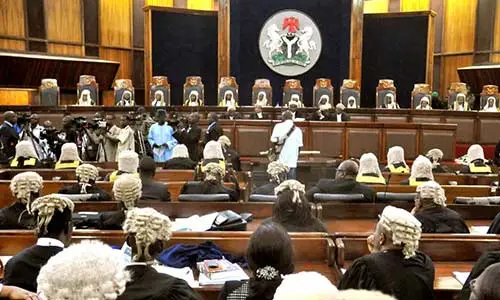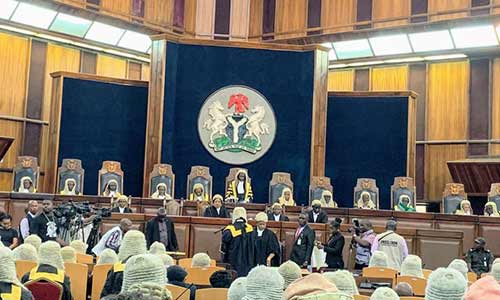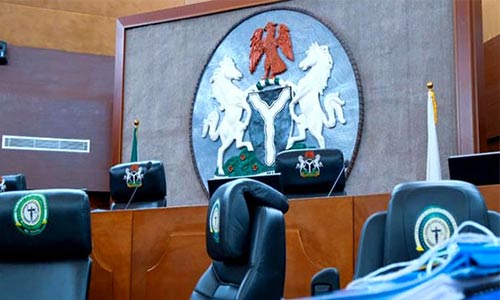SUPREME COURT JUDGEMENTS 25/07/2023
Failure To Join A Necessary Party: Effect On Court’s Jurisdiction

In the Supreme Court of Nigeria
Holden at Abuja
On Friday, the 31st day of March, 2023
Before Their Lordships
Musa Dattijo Muhammad
Chima Centus Nweze
Uwani Musa Abba-Aji
Mohammed Lawal Garba
Helen Moronkeji Ogunwumiju
Justices, Supreme Court
SC.365/2022
Between
Revenue Mobilisation Allocation Appellant
and Fiscal Commission (RMAFC)
And
1. Attorney-General of Rivers State
2. Accountant-General of the Federation Respondents
(Lead Judgement delivered by Honourable Helen Moronkeji Ogunwumiju, JSC)
Facts
The Appellant is an executive body established by the Constitution of the Federal Republic of Nigeria 1999 (as amended), with the mandate to review the revenue allocation formulae and principles in operation, to ensure conformity with changing realities. Thus, on 27th February, 2017, the Appellant wrote the Rivers State Government, communicating its decision to update the Appellant’s records and ensure continuous compliance with constitutional provisions on application of 13% Derivation Principle and Allocation of Revenue (Abolition of Dichotomy in Application of Derivation) Act 2004.
The above-mentioned invitation was extended to all littoral States entitled to 13% Derivation, from exploration activities in the oil and gas sector of Nigeria. On conclusion of the exercise, the Appellant informed stakeholders of the outcome of the exercise and conveyed its reports to the then Department of Petroleum Resources. The summary of the Appellant’s exercise is that a certain Okoro Oil Field in OML 112 operated by AMNI International Petroleum, was actually located offshore Akwa Ibom State rather than offshore Rivers State (as was previously reported).
Further to this, Akwa Ibom State, via a cover letter dated 13th March, 2019, requested for the refund of derivation revenue from Okoro Oil Field from July 2008 to September 2018. The Appellant then worked out the derivation in monetary terms for the period and summed the amount to be refunded to Akwa Ibom by the Rivers State Government to be N56,257,481,619.34 (Fifty-six billion, two hundred and fifty-seven million, four hundred and eighty-one thousand, six hundred and nineteen Naira, thirty-four Kobo). The Appellant decided that the sum of N502,298,934.03 which had been wrongly paid monthly to Rivers State over 112 months, should be reversed. The 2nd Respondent was also informed to implement the refund of the said derivation revenue wrongly paid to the Rivers State Government, from July 2008 to September 2018.
Given the above, the 1st Respondent commenced an action via an Originating Summons at the Federal High Court, sitting in Abuja, seeking several declarations and reliefs against the Appellant and the 2nd Respondent. One of the key declarations sought by the 1st Respondent, was that the provisions of Section 235 of the 1999 Constitution gives a stamp of finality to any decision of the Supreme Court of Nigeria in respect of the Oil field in OML 112 offshore, and that same renders the Appellant’s administrative acts of review to be unconstitutional, null and void and of no effect whatsoever. The Appellant, who was served with the Originating Processes and hearing notices, did not defend the Originating Summons. At the end of the hearing, the trial court determined the sundry applications filed in the suit, and refused the motion to arrest its judgement. Thereafter, the court delivered its judgement, granting all the reliefs sought by the 1st Respondent.
Dissatisfied, the Appellant appealed to the Court of Appeal. The appellate court affirmed the decision of the trial court, and dismissed the appeal. The Appellant further appealed to the Supreme Court. The 1st Respondent challenged the competence of the grounds of the appeal, by way of Preliminary Objection.
Issues for Determination
Issue in the Preliminary Objection
Whether Grounds 1,2,3,5 and 6 contained in the Appellant’s Notice of Appeal are competent in law, the said grounds having been raised as grounds of mixed law and facts or facts only, without seeking and obtaining the requisite leave of court; and whether Ground 4 of the Appellant’s Notice and Grounds of Appeal, is incompetent and defective in law, having not challenged the ratio of the judgement of the lower court.
Issues in the Substantive Appeal
1. Whether by virtue of Section 232 of the Constitution of the Federal Republic of Nigeria, the trial court has jurisdiction to determine whether the revenue accruable from Okoro Oil Field in OML 112 is attributable to Rivers State Government.
2. Whether Akwa Ibom State is a necessary party to the action.
Arguments
Arguing the objection, counsel for the 1st Respondent stated that Grounds 1,2,3,5 and 6 of the Appellant’s Grounds of Appeal are grounds of mixed law and facts or facts only which were filed in contravention of Section 233(3) of the 1999 Constitution, as the Appellant did not seek prior leave of court before filing same. Likewise, he argued that Ground 4 did not relate to the ratio of the judgement of the court below. Counsel emphasised what constitutes a ground of law, distinguishing it from ground of mixed law and facts – OGBECHE v ONOCHIE (1986) LPELR-2278(SC). The Appellant reacted to the Preliminary Objection by stating the principle of law that, where a ground of appeal involves questions of law alone, the ground alone can sustain a Notice of Appeal without leave – ACB v OBMIANMI BRICK & STONE (NIG.) LTD. (1993) 5 NWLR (Pt. 294) 399 at 419. Counsel argued that Grounds 1 and 2, being issues of jurisdiction relating to the interpretation of a court judgement and entertaining an action in the absence of a necessary party, are enough to sustain the appeal. He posited that all the grounds of appeal were of law alone, which do not require leave.
On the substantive appeal, counsel for the Appellant submitted that the trial court lacked the jurisdiction to hear and determine the Originating Summons given the direct implication of Section 232(1) of the 1999 Constitution, which envisages that disputes either of fact or law pertaining revenue sharing between the Federal Government and State or between States in the Federation, are exclusively within the jurisdiction of the Supreme Court. Counsel argued that further to the letter headed “Attribution of Okoro Oil Field”, the subject-matter was one falling within Section 232 of the 1999 Constitution, and since the scope of the dispute was one showing existence of the legal right of both Akwa Ibom State and the Rivers State to the benefit of the 13% derivation from crude and gas production from Okoro Oil Field, the only court with jurisdiction to hear and determine the subject-matter is the Supreme Court. Regarding the other jurisdictional issue of whether Akwa Ibom State is a necessary party, counsel submitted that since Akwa Ibom State had undisputed interests in the attribution and payments of monies flowing from the Appellant’s report, Akwa Ibom State was a necessary party for the just determination of the Originating Summons.
Responding, counsel for the 1st Respondent argued that the questions for determination and declaratory reliefs sought at the trial court were to satisfy that the Appellant violated and denied, by administrative fiat, the proprietary rights of Rivers State Government over OML 112 which had earlier been granted to the Rivers State Government by virtue of the decision of the Supreme Court in Suit No. SC/27/2010 between A-G RIVERS v A-G AKWA IBOM & ANOR. He submitted further that the injury for which the 1st Respondent invokes the judicial powers of the trial court relates only to the administrative acts of the Appellant, and since the Appellant is a creation of constitutional and statutory laws, the Appellant was an agent of the Federal Government of Nigeria, thus, vesting exclusive jurisdiction in the Federal High Court vide Section 251 of the 1999 Constitution. On the issue of necessary parties, counsel contended that the injury suffered by the Rivers State Government was caused solely by the Appellant; and as such, only the Appellant was the necessary party.
Court’s Judgement and Rationale
Deciding the Preliminary Objection, the Apex Court outlined the Grounds of Appeal filed by the Appellant, shorn of their particulars, and evaluated same. The court found that Ground 1, which seeks a determination whether the lower court can interpret by Originating Summons, a judgement of the Supreme Court as an “Instrument” within the meaning of Order 3 Rule 6 of the Federal High Court (Civil Procedure) Rules 2019, is a ground of law. Also, Ground 2 which relates to whether a party is a necessary party, is a ground of law. Ground 3 challenges the jurisdiction of the trial court to determine the matter arising from the contents of Exhibit A8, is also purely a matter of law. Ground 5, which challenges the mode of instituting the action and its suitability, is a question of law. Ground 6 relates to pre-judgement interest, and the law is that this is determined by the law binding the contract or circumstances of the parties. Thus, the grounds of appeal being grounds of law, obviate the need to seek and obtain leave of court before filing the appeal.
On the main appeal, in determining the court’s jurisdiction to entertain the subject-matter which relates to the administrative action of an agency of the Federal Government in respect of boundaries between two States, the Apex Court referenced several decisions where similar issues have been pronounced on. Relying on its earlier decision in A-G RIVERS v A-G FED. & A-G AKWA IBOM STATE (2012) ALL FWLR (Pt. 646) 408, their Lordships held that revenue allocation is not one of the items over which the Federal High Court has jurisdiction, as provided in Section 251 of the 1999 Constitution. In this case, the Supreme Court held that it has jurisdiction to entertain actions being primarily for the determination of the ownership of the maritime territory on which the disputed oil wells were located between the parties/disputants.
Deciding the second issue on the joinder of Akwa Ibom State, the Apex Court reiterated the principle of law that in general terms, a Plaintiff cannot be made to proceed against a party he has no desire to sue; however, a party must be joined if there is a question that cannot be determined without him – GREEN v GREEN (1987) LPELR-1338(SC). Necessary parties are those in whose absence the subject-matter of the proceedings would not be fairly dealt with. In this case, questions 4 and 5 of the Originating Summons turn on who is entitled to payment of the revenue accruable from OML 112 or Okoro Oil Field. It was observed from paragraphs 10, 11, 14 and 16 of the 1st Respondent’s Originating Summons that the background of the complaint copiously mentioned the contention between Rivers State and Akwa Ibom State, relating to boundary disputes over the same oil fields.
In our adversarial system of jurisprudence, it is important that there should be an end to litigation on a subject-matter and failure to join a party whose interests, whether anticipatory or not, would be affected, goes to the root of the jurisdiction of the court. With the financial interest of 13% Derivation revenue, the stake of Akwa Ibom State was apparent. In this respect, the Apex Court held that the lower courts made decisions against the interest of Akwa Ibom State without hearing from the State, and, as such, violated the right of Akwa Ibom State to a fair trial. The judgements of the lower courts were thereby declared null and void, and the proceedings of the trial court was struck out for failure to join Akwa Ibom State, which is a necessary party.
Having resolved both jurisdictional issues against the 1st Respondent, their Lordships, unanimously allowed the appeal of the Appellant.
Appeal Allowed.
Representation
Abdul Mohammed, SAN with Obiabo Francis Amedu, Debo Johnson, Mrs. Chiemelie Nneoma Ayo and Abusufyanu Abubakar for the Appellant.
R.A. Lawal-Rabana, SAN; A.O. Okeaya-Inneh, SAN; and Eko Ejembi Eko, SAN with Emmanuel Asido, Ifeanyi Okpor for the 1st Respondent.
Yahaya Abubakar for the 2nd Respondent.



